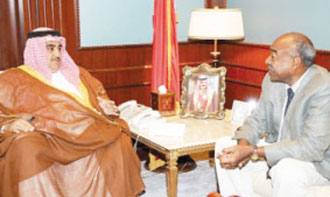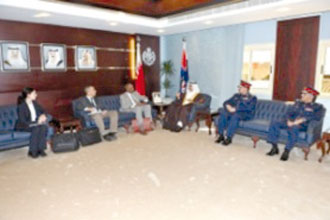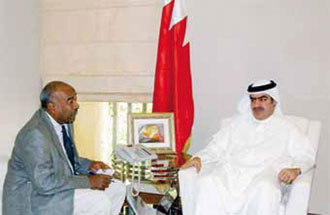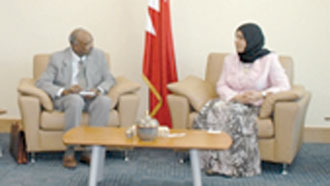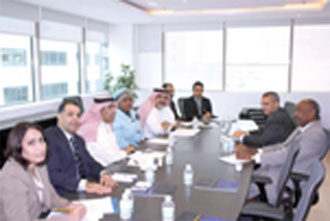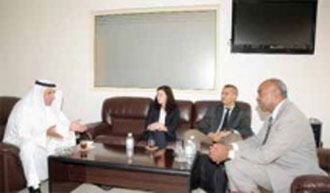
|
 |
 |
|
|
|
|
|
|
|
|
|
|
|
|
|
|
|
|
|
|
|
|
|
|
Amnesty International: Fact-Finding Mission to BahrainA delegation from Amnesty international, headed by Professor Abd al-Salam Sayyid Ahmad visited Bahrain in October 2010. The delegation included the researcher in the Middle East section Said Bou Madouha, as well as the Regional Campaigner in the Middle East and North Africa program, Covadonagadi Lakamba. The delegation met several officials and ministers, human rights activists, civil society organisations, the National Institution of Human Rights (NIHR), as well as Bahraini political figures, media institutions and other influential figures.
During the visit, the delegation was briefed on the political and human rights situation in Bahrain, and on 28 October 2010, attended the first public session of the trial of the detainees accused of involvement in violence. In addition, the delegation also had the opportunity to follow the elections, which took place on 23 October 2010. Amnesty International had, since last August, issued several statements, in which it expressed its concern regarding allegations of human rights violations. This involved the detention of tens of individuals accused of inciting and perpetrating violent acts, such as blocking roads, setting fires and damaging private and public properties. On 18 August 2010, Amnesty International urged the Bahraini Government to disclose the whereabouts of eight detained individuals, among them clergymen, as it feared that they may be prisoners of conscience. It called upon the Government to explain the reason behind their detention, and either to release or charge them. It also demanded access by all detainees to their families, lawyers and medical care. Furthermore, Amnesty urged the Bahraini Government to conduct an urgent and independent investigation regarding allegations of torture by a number of detainees, and also called upon it to ensure that these detainees are given a fair trial in accordance with international standards. In another statement, Amnesty expressed its deep concern regarding the Government’s decision to dissolve the BHRS’ Board of Directors, saying that this action undermined fundamental freedoms. It called upon the Government to immediately revoke the decision, and criticised the Associations Law No. 21 of 1989, for giving the authorities extensive power to prohibit organizations, freeze their activities or interfere in their internal affairs. Moreover, Amnesty issued two other statements on 6 September 2010, in which it stressed the importance of allowing the detainees to regularly contact their lawyers and families, something which had already been permitted. Amnesty International visited Bahrain to examine the current situation, and was welcomed by the Government, which allowed the delegation full freedom to meet both Government and civil bodies. The Ministry of Social Development also prepared and coordinated meetings between the delegation and concerned parties, including NGOs. Initially, the delegation met the Minister of Social Development Dr. Fatima Al Buloshi, and a number of officials from the Foreign Ministry. On 28 October 2010, it met the Bahraini Foreign Minister, and discussed the human rights situation, stressing the importance of cooperation and transparency in the relationship between the Government and Amnesty. The delegation also stressed the fact that 'the Kingdom of Bahrain has taken big steps in promoting democracy and human rights, in the context of the comprehensive reform project of HM King Hamad bin Esa Al Khalifa. Since HM ascended the throne, he has promoted human rights principles, such as citizenship, freedom of expression and the right to practise religious rituals'. The delegation also described these steps as 'a qualitative leap in the region.' On 27 October 2010, the delegation met the Minister of Interior, during which he affirmed the King and the Government’s eagerness to safeguard freedoms, including freedom of expression. He also pointed to the necessity of ‘obtaining information from trustworthy sources’, and on ‘avoiding reliance on partial opinions that give a distorted view of events’. During the meeting, the delegation also discussed ways of mutual cooperation and coordination. On 28 October 2010, the Amnesty delegation met With the President of the Information Affairs Authority, and discussed the reasons behind the closure of some websites, and the ban imposed on the political societies’ newsletters. The delegation also met with NIHR, and discussed ways of mutual cooperation The NIHR provided thorough analysis of recent human rights developments. Both parties stressed the importance of continuing meetings and discussions in order to ensure mutual coordination in all human rights fields, and that NIHR should be a source of information for the human rights situation in Bahrain. The delegation praised the establishment of the NIHR because of its role in promoting and safeguarding human rights in Bahrain. It also added that it was important for NIHR to become a solid and trustworthy bridge, through which Bahraini civil society organizations are able to communicate with official institutions. It also stressed that it was necessary for NIHR to maintain its impartiality, and not to succumb to pressure, be it from the Government or from civil society organizations. Among those who also met the Amnesty delegation were: the Justice Minister, representatives from the Bahrain Human Rights Society, the General Director of al-Wefaq Society (political party), the Bahraini Bar Association, the families of detainees in recent security events, and the President of the Journalists' Association, Esa al-Shaiyji. During a meeting with the latter, several issues were discussed including: freedom of press in the country; laws relating to freedom of expression including the Press and Publications Law, the Audio, Visual and Electronic Media Law; the role of the Journalists' Association in defending journalists; and the obstacles facing journalism. SummaryCriticisms by international organisations of certain governmental procedures, which have led to human rights violations, do not necessarily indicate that these organisations are deliberately attempting to defame the Government. Nor do they mean that international organisations are not genuinely concerned about the development of human rights in Bahrain, or that they are denying the achievements of the Government in this field. Local and international organisations have both criticised Government measures that restrict public freedoms, such as the closing of certain websites, withdrawing the licences of some party-affiliated newsletters, and dissolving the board of directors of a human rights society. We, among other human rights activists, believe that these measures are unsuitable and in fact harm Bahrain’s reputation and the course of its reforms. It is commendable that Bahraini officials have reconsidered their decisions, some of which came as initiatives from the King himself, who, for example, directly ordered the reinstatement of Bahraini citizenship to the representative of Sayid Ali al-Sistani in Bahrain, Sheikh Hussain Najati. There are also attempts to rectify the issue of the Bahrain Human Rights Society and other controversial issues, such as removing restrictions from some websites. Bahrain will not be harmed by minor offences by civil society organisations or by unintentional breaches by the Executive Authority. However, persistent breaches and the failure to address or rectify mistakes will certainly harm Bahrain's present and future reputation as well as the reform project. We hope that the Government and civil society organisations take seriously and positively the recommendations and comments of human rights organisations into account, especially Amnesty International. |
